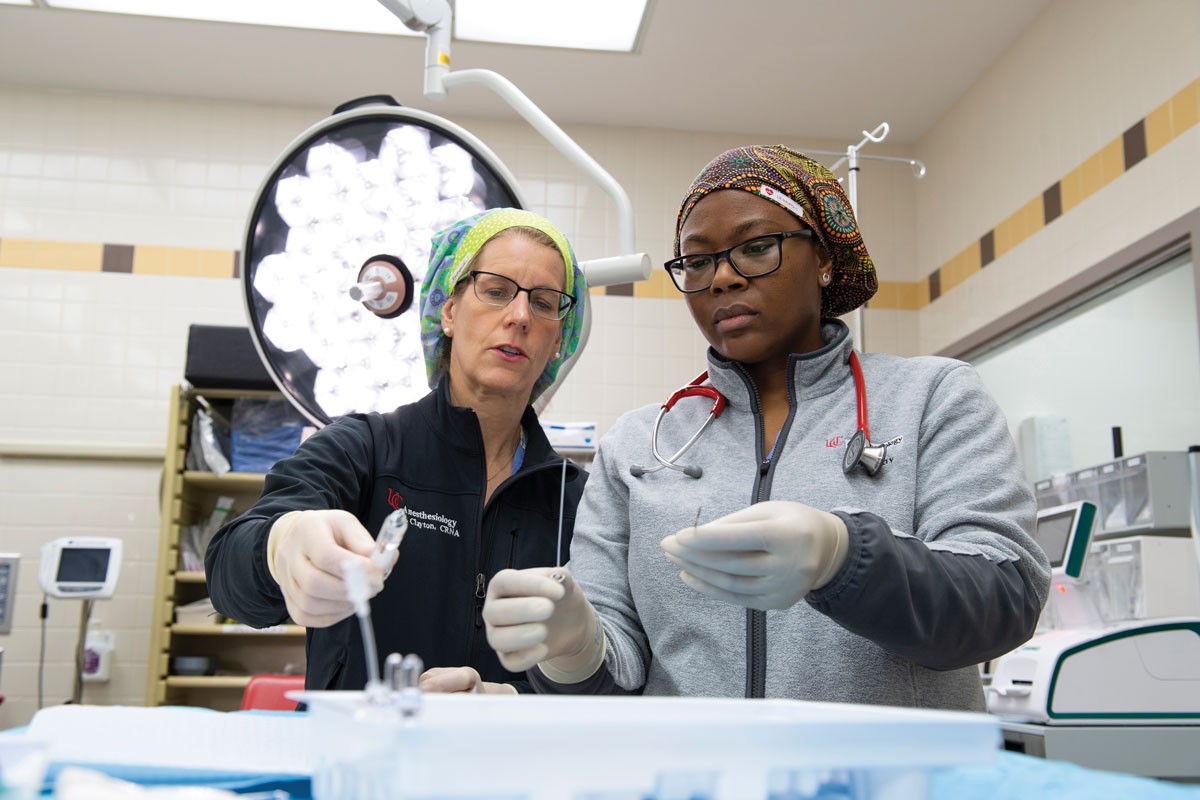
UC nursing faculty helps develop framework to improve maternal health outcomes
Expert committee releases report with short- and long-term recommendations

Beth Ann Clayton, DNP, CRNA, FAANA, FAAN
An expert committee that included a University of Cincinnati College of Nursing professor has released a new report with practical recommendations for enhancing maternal morbidity and mortality measurement to improve maternal health outcomes in the United States.
Beth Ann Clayton, DNP, CRNA, FAANA, FAAN, director of UC's nurse anesthesia program, was selected in 2019 to serve on the Maternal Morbidity and Mortality Committee, convened by the National Quality Forum (NQF) and funded by the Centers for Medicare & Medicaid Services. Throughout a 24-month period, the committee guided an assessment of current maternal morbidity and mortality measurements and recommended ways to enhance these measurements and improve health outcomes in maternity care.
Maternal morbidity and mortality indicators have steadily increased since 2000 in the U.S., according to the Centers for Disease Control & Prevention. In 2018, the maternal mortality ratio reached 17.4 maternal deaths per 100,000 live births – two to 10 times higher than nearly a dozen other developed countries with comparable inputs. This ratio is more than double for non-Hispanic Black women – 37.3 deaths per 100,000 live births. Women living in rural areas are also at greater risk for maternal mortality or severe maternal morbidity.
"Maternal health remains a tremendous challenge," Clayton says, adding that, each year in the U.S., 700 women die from pregnancy or delivery complications and more than 50,000 women suffer from unexpected outcomes of labor and delivery that result in negative health consequences.
The final NQF report includes two key measurement frameworks that account for the various influences on an individual's health outcomes related to maternal morbidity and mortality. These influences include health literacy, race, ethnicity, and other social determinants of health that are shown to exacerbate health disparities. The report offers recommendations and tangible steps for short and long-term measurement approaches throughout the maternal life cycle.
Clayton, a certified registered nurse anesthetist, has been providing obstetric anesthesia care in a variety of clinical settings for over 20 years. In addition, through the AANA Foundation, she led the obstetric anesthesia closed malpractice claims analysis. This work identified patterns of injuries and precipitating events and provided recommended interventions to improve care. Following this research, she was a primary author for the national "AANA Analgesia and Anesthesia for the Obstetric Patient Practice Guidelines" which provides clinicians a standardized approach to decrease maternal morbidity and mortality.
"It was a unique opportunity to participate on the committee to address gaps in health equity and improve maternal health through the development of recommendations and steps for short and long-term measurement of maternal health," Clayton says. "It was an honor to represent the University of Cincinnati on this important NQF work and contribute to the advancement of maternal care."
Image at top: Beth Ann Clayton and alumna Candace Holloway/Photo/Colleen Kelley/UC Creative + Brand
Related Stories
UC student over the moon about NASA co-op
April 22, 2025
When he graduates from UC’s School of Information Technology in May 2025, Colin Malott will have three years of interning with NASA to put on his resume. Malott was awarded a Scholarship for Service through the government agency whose leadership says he has all of the qualities that make a model intern.
UC researcher develops at-home diagnostic test for endometriosis
April 21, 2025
Katherine Burns, a University of Cincinnati researcher who has endometriosis, speaks about her journey of developing a non-invasive diagnostic test for the condition.
CCM welcomes new music theory faculty member Nathaniel Mitchell
April 21, 2025
UC College-Conservatory of Music Dean Pete Jutras has announced the appointment of Nathaniel Mitchell, PhD, as CCM's new Assistant Professor of Music Theory. His faculty appointment officially begins on Aug. 15, 2025. Mitchell is a music theorist whose research investigates the cognitive, cultural and structural dimensions of musical creativity in genres ranging from eighteenth-century opera to bluegrass and video games.
